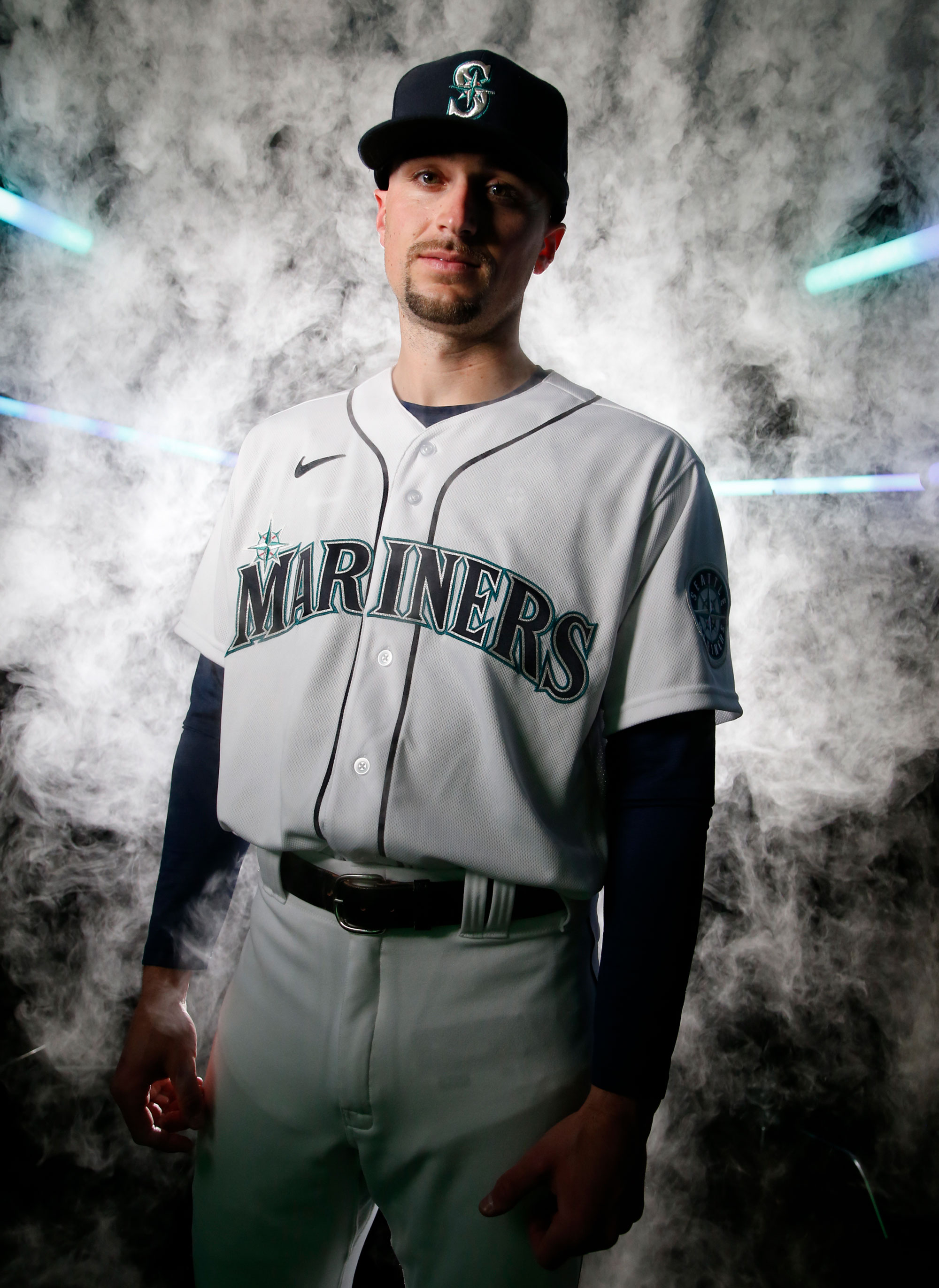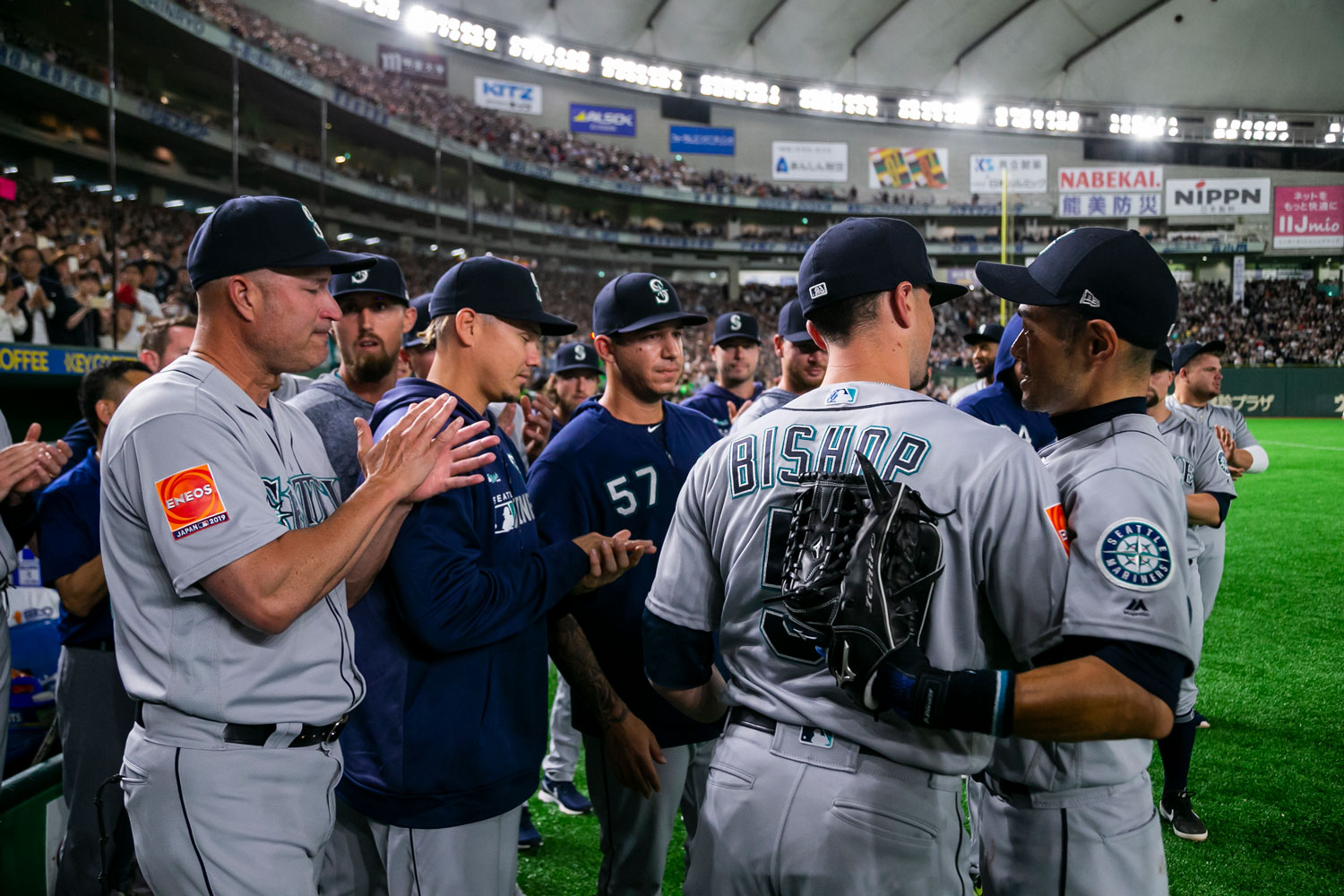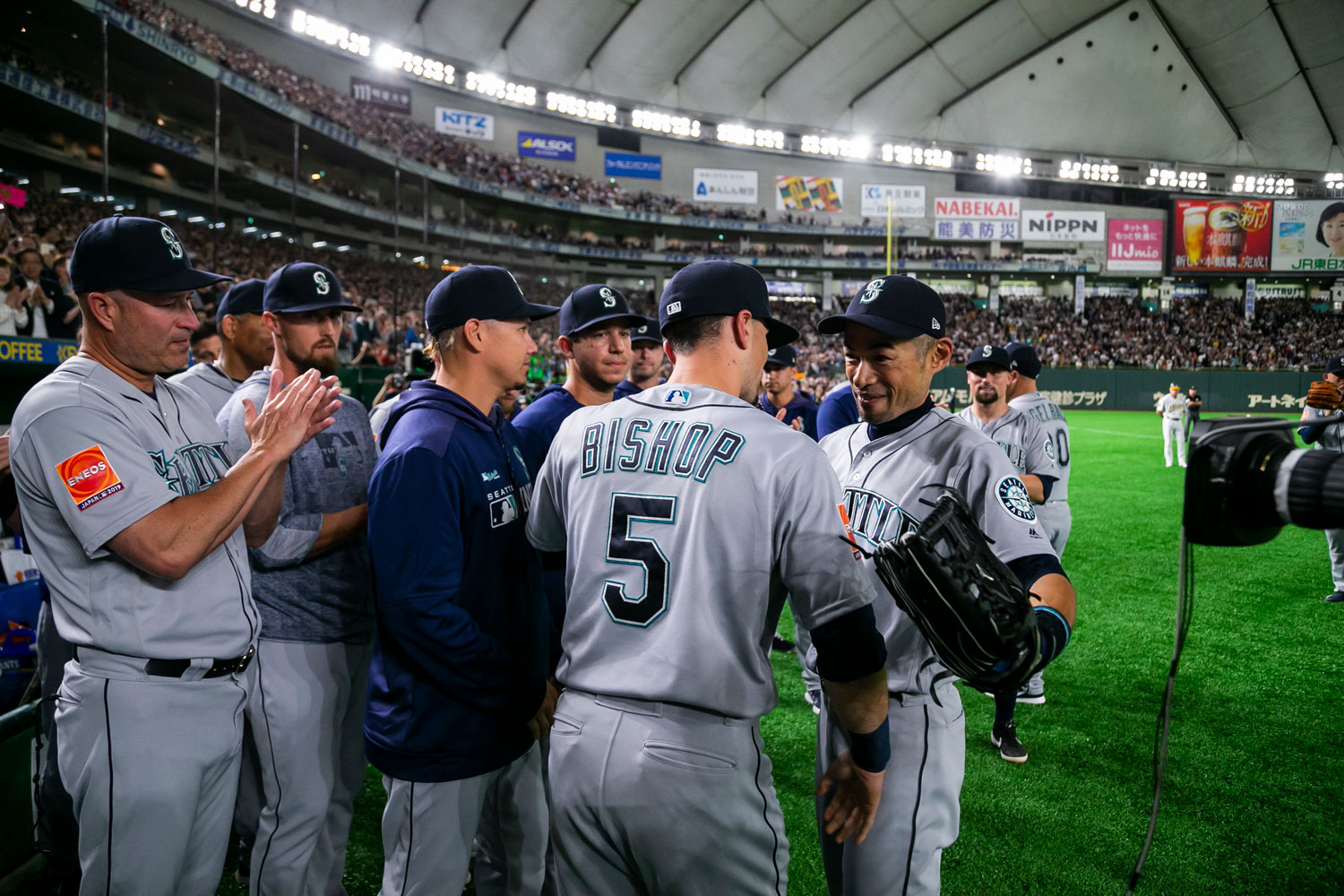The Replacement The Replacement The Replacement
Braden Bishop starred in the outfield at the UW, but it’s a Mariner moment for which he’ll never be forgotten.
By Mike Seely | Photos by Ben VanHouten/Seattle Mariners | April 24, 2024

On March 21, 2019, Ichiro Suzuki played his final game as a Seattle Mariner. The game, which the Mariners would go on to win in 12 innings against the Oakland Athletics, was not played at T-Mobile Park, but at the Tokyo Dome in Ichiro’s native Japan.
In the bottom of the eighth inning, Ichiro took his customary spot in right field. But before a pitch was thrown, he was removed for a defensive replacement. That defensive replacement was former University of Washington outfielder Braden Bishop — in his major-league debut, no less.
After 47 games spread across three seasons for the Mariners and a prodigious career in the minors, Bishop has moved on from baseball. He now devotes his time to running a charitable foundation, 4MOM, that provides financial and emotional support to families impacted by Alzheimer’s and dementia.
Sadly, Bishop can relate. His mother, Suzy, died in 2019 after a bout with Alzheimer’s. Bishop recently took some time to discuss his philanthropic work with UW Magazine, as well as that moment back in 2019 when he became an indelible part of Seattle sports lore.
UW Magazine: I want to take you back to the moment that cemented you as the answer to a Seattle sports trivia question: the day you made your Major League Baseball debut replacing Ichiro Suzuki in the outfield in his final game. Did anyone give you a heads-up before the game that such a scenario could unfold, or did it all happen on the spot? Also, remind me who slid over to right so you could enter the game in centerfield.
Braden Bishop: I came up through the minor leagues as a centerfielder, but I also knew that once you get to the big leagues, you’re playing whatever position they need you to play. We had played two exhibition games against the Tokyo Giants and one game against Oakland. I’d gone in to be a defensive replacement for Ichiro in the two exhibition games, so I kind of had an idea of how it would play out. I didn’t know what inning that he would get the curtain call, but obviously I knew it would be all about him.
I knew I would get thrown into the fire, so I had to be ready. They did not give me much of a heads-up. It was maybe within three outs that I found out. Once he came out, they said, ‘Slide to center,’ and [Mitch] Haniger went to right.
When Ichiro came out, there was an emotional, four-minute delay in the action so he could hug everyone in the dugout, including you. What did you say to him as you embraced?
I don’t remember the exact words I used. It was basically, “It’s been an honor to be your teammate and you deserve this.” He had been really good to me through spring training. We were locker mates. He was always awesome to me and his translator, Allen [Turner], was awesome to me.
- After a 19-year career in the MLB and 14 seasons with the Mariners), Ichiro Suzuki made his final appearance with his teammates on March 21, 2019.
- Braden Bishop, who played in the outfield for the UW’s baseball team, replaced Ichiro on the field after his final game.
Once the cheers and tears died down, what was it like trying to lock in? Do you remember your first putout?
I remember that they had let him go out and warm up and then once the pitcher was done throwing his warmup pitches, they pulled everyone off the field and let him have his moment. So, I didn’t get to warm up. I remember going in and said, “Can I play catch with somebody?” I was playing catch with Haniger and everybody was watching me warm up. My body was loose; my arm was not. My first putout was a pretty routine fly ball. I remember throwing it in to Dee Gordon and he gave it right back to me. If it weren’t for Dee, that ball probably would have wound up in the stands somewhere.
Was Ichiro’s English really a whole lot better than he let on during press conferences?
He can have a good conversation with you, but if he’s trying to get really in-depth, it’s a little easier for him to go to Allen.
You last played at the AAA level two years ago. Have you moved on from baseball professionally or are there still things you’d like to accomplish in the sport, either through a comeback on the field or in some other capacity?
I’m fully done. My last year was really the start of the change of minor league baseball in terms of who they target. Pre-COVID, AAA was guys like me — upper 20s, early 30s, guys who’d played in the big leagues. There was a job every year. Post-COVID, you get rid of all the minor league teams and organizations like young players because they’re controllable and they’re heavily algorithm-weighted now. You could pick a young player who’s controllable and pay them the minimum instead of paying an older guy who’s not controllable more than the minimum. Obviously, the algorithm is going to favor the younger player.
I just had to be realistic. I loved playing and the routine and the process and trying to chase something and become great. I just got burnt out on everything. I accomplished everything I set out to accomplish, minus a few things. Walking away with my peace gave me the opportunity to dive into the charity a little more and be a dad and a husband. When you’re playing professional sports, it’s really all about you.
View this post on Instagram
Let’s talk a bit about your experience at the University of Washington. What led you to choose the school over turning pro or attending another college?
My mom went to UCLA, so I really thought I was gonna end up there. I did not know about the University of Washington. I did not know where it was. The summer between my freshman and sophomore year of high school, one of my old coaches, Jordan Twohig, had just gotten hired on UW’s staff. He said, “Come up for a visit.” They got me to come up in the summer, which you can’t beat, and I fell in love with the campus. It was beautiful.
One of my priorities was having sports on campus and walkable and everything close. The way the UW is set up, with everything right there, that was obviously big to me. I knew it rained, but when you go in the summer, you don’t know what it’s like. Getting away from home was important, because I knew if I didn’t, I’d want to be home all the time. UW hadn’t been good for a while and I wanted to be part of a team that brought a program back or changed the culture.
What were some of the lessons you learned at the UW that you’ve carried with you into the rest of your life, on the field and off?
I went in as a relatively big recruit. I’m not gonna say that I was the biggest, but I got drafted. In my class, there wasn’t a ton of us. I came in there with high expectations, and I did not play well my freshman year. I did not start early. I was platooning, defensive replacement, pinch runner, stuff like that. The weather was not what I thought it was gonna be. It seemed like I had taken such a massive step back and was failing.
There were multiple points where I was gonna leave, I was gonna go home, somewhere that’s comfortable. I was really lucky that my dad made me stick it out because after that summer, sophomore year I had a great year. And I was like, “If I just persevere through tough times, when you really want to give up, what’s on the other side of that is something special, where you can find your true potential.”
I’m well-versed in the history of your Alzheimer’s charity, but tell me how it’s evolved over the past couple of years and what initiatives or events you might have coming up?
Events and philanthropy in the COVID era were very tough. We had caught such steam in 2018 and 2019 and were really growing into something special. It took us a while to get some steam rolling again. Within the last year, we’ve kind of changed our philosophy because my wife’s basketball coach at UW, Kevin Morrison, he was actually diagnosed with Alzheimer’s and his family got in touch with us.
I know how hard it is to be a caregiver and the financial struggle it puts on a family, and he had four kids at the time. We switched our philosophy into grant work, where we could raise money and give it to the family so they can pay tuition, bills, groceries. I think we were able to raise over $120,000. It got him through the back half of this and, unfortunately, he passed away last year. There have been additional family grants since Kevin. It’s not just about raising awareness, it’s about putting boots on the ground. We’re going to evolve to where we can pay people’s medical bills and other bills directly.
Events-wise, usually we do a big golf tournament in the fall in Arizona and we’re going to do a comedy show next spring training in Arizona.
Tell me a bit about your family life — where you live, kids, spouse, et cetera. I know you have a young son.
I’m back in California but spend a good amount of time in Arizona. My son is 3 years old and just starting to pick up a bat and swing it. My wife, Brianna Ruiz, started playing basketball at UW in 2013.
Did you two meet at UW?
Yep, which is crazy because we’re both from the Bay Area. She grew up in Sacramento, so that’s probably why we didn’t know each other.
I read about how UW had developed a breakthrough Alzheimer’s drug that’s been shown to reduce cognitive decline in patients. Are you optimistic that there are medical breakthroughs on the horizon that could either improve or stabilize people’s condition?
In those first three years with my mom, if we would have known what we knew now in terms of sleep, nutrition, environment, lifestyle, I think we could have really helped her control symptoms and could have extended that nine years to like 15 or 20. In terms of medical treatments, some people are doing some really amazing work, but I also think the brain is so complex that the sooner people can realize that there’s not going to be some magical cure through a drug, the better. I am by no means a neurologist or neuroscientist, but I think in terms of what we’ve learned and just committing myself to try and better some people’s lives in this arena, it really takes work, and it starts in people my age. In your 20s and 30s, you’re setting yourself up for your cognition in your 50s and 60s and beyond. I think that education piece is big.
Do you still keep close tabs on Husky and Mariner baseball and, if so, what are your hopes for each team this coming season?
I definitely keep close tabs on the Dawgs just because coach [Jason] Kelly, I played for him when I was there, so it was cool to see him come back. There’s no better players’ coach than him and just happens to be a really good pitching coach and recruiter. I think in the next five to 10 years, UW’s gonna be in a really good place.
As for the Mariners, there are some good players and then there’s Julio [Rodriguez]. This kid’s different. He’s special. The way he processes things, the humility — the whole package, it’s there.

